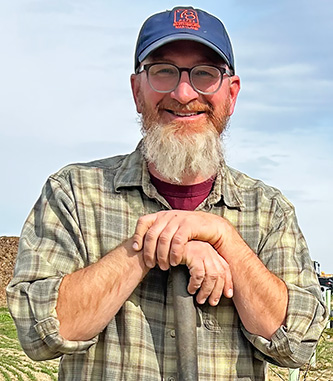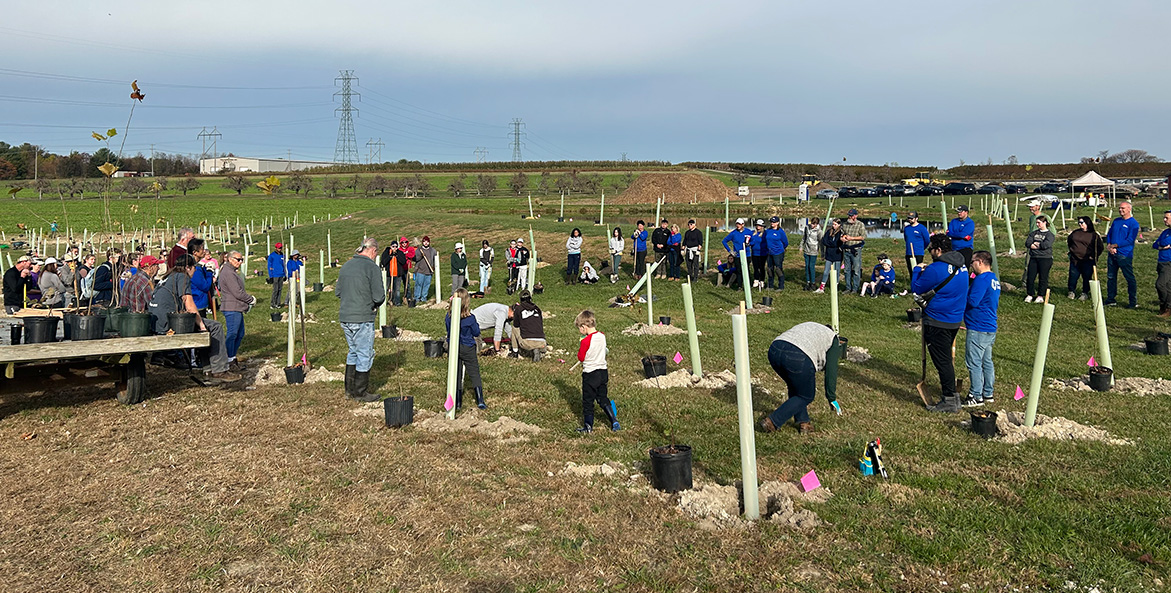Matt Harsh is an open-minded farmer who is eager to implement new regenerative agricultural practices on his farm while supplying locally grown fruits and vegetables. Late last year, Harsh worked with CBF and roughly 80 volunteers to plant more than 600 trees on his farm in Smithsburg, Maryland, to go toward these efforts.
A fifth-generation family farm, Harsh’s 78 Acres Farm is dedicated to producing fresh, local produce. Locally grown produce is a fresh and better alternative to commercially available foods. Since transportation is not far, locally grown produce can be consumed closer to harvest. Because of this, they retain more of their vitamins and nutrients, making them healthier than non-local options. Locally grown produce is also good for communities by supporting the farmers who grow them, and in return boosting the local economy.
Originally, an aspiring architect, Harsh quickly changed course while studying at Virginia Tech to pursue his love of farming and working outdoors. After this realization, he switched to studying horticulture and set sights on working on the family farm.
Harsh’s farm was originally purchased in 1939 by his great grandfather. After graduating school and working on the farm, which was owned by his mother and uncle at the time, Harsh took over a portion in 2010 and turned it into the 78 Acres Farm that we know today.
On the 78 Acres Farm you will find quality, homegrown produce in Maryland. These range from delicious fruits such as apples, peaches, pears, and grapes to just about any vegetable you can name, including squash, cucumbers, onions, and broccoli. Volunteers and CBF staff were able to experience the farm firsthand during the tree-planting event, in which Harsh shared his wide plethora of apples. It should be noted that every person who took a bite of an apple that day had a smile on their face.
Along with tasty apples, the 78 Acres Farm supplies local businesses with their produce, including farmers’ markets in Northern Virginia, Washington D.C., and Boonsboro, Maryland, as well as 8 different Wegmans grocery stores across Maryland. Harsh also supplies other farmers in the area at Moon Valley Farm, South Mountain Creamery, and Pleasantville Produce. Even his grapes are enjoyed at four different wineries throughout Maryland.

Matt Harsh, owner of 78 Acre Farm.
Rob Schnabel/CBF Staff
Helping local businesses is one way Matt creates a positive impact in the community, but another way he does so is by incorporating regenerative agriculture practices on the farm. “We’re trying to eliminate as much tillage as we can,” he says.
Harsh is a vocal advocate for no-till farming and is currently growing all his winter squash and sweet corn on 20 acres of untilled soil. No-till farming is becoming more widely accepted in the U.S. since it reduces soil erosion, as well as improves nutrient cycling, soil moisture, and drought resilience. All these factors help establish better, healthier crops year after year.
Looking to the future, Harsh aims to implement no-till farming on more of his land, creating a healthier environment on the farm. “I would really like to get to being 100 percent no-till on [all] the vegetables,” he says.
He expresses how successful he was with the winter squash and sweet corn no-tilling and believes that he can mimic the same results on the rest of the vegetables. His only regret—not starting sooner.
Even from an economic standpoint, Harsh stresses that the direct seeding tools he bought to plant without tilling have “paid for themselves many times over.” The return on healthy soil is a win-win scenario for any farmer looking to improve their crop quality and maximize profits.
In combination with no-tilling, Harsh also plants cover crops on the entire vegetable portion of 78 Acres Farm. Cover crops further prevent erosion along with no-till while also reducing compaction and increasing organic matter. Some farmers use plastic instead of crops to get a similar effect, creating unnecessary waste.
“I’m always trying to come up with a way that we can get away from using so much plastic.”
Harsh is also improving communities by hiring workers through the H-2A program. H-2A is a federal program which allows farmers to bring in foreign nationals to the U.S. for temporary work. In return, farmers like Harsh provide these people with job security, housing, food, and more.
Harsh has only high praise to speak of for his workers and views the money he pays them with as going directly back to their communities when they return home from the program. He views H-2A as more of “a rural development program” with the impact it has. They are “building houses, educating their kids, and improving the standard of living,” says Harsh.
When asked to give advice to any future farmer, Harsh says to always “keep looking for new opportunities and keep your mind open about them.” He credits this mentality to how he first got initiated with Wegmans and how he continues to stay successful after 13 years.
Interested in joining our restoration efforts? Join us for an upcoming tree planting—like the one described above—on a farm in Maryland!




